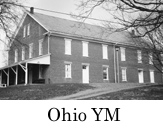Annual Monitor (1858), pp. 47-50.
From the remembrance of the fervent piety and usefulness of this dear friend, and the abiding concern she manifested for the cause of her Lord and Master, we are induced to record a brief testimony to her Christian worth, and to the efficacy of that grace and faith, by the effectual working of which she was made what she was; desiring that others may thereby be stimulated to follow on in the path of righteousness and peace, that they may obtain the same precious hope in the mercy of God through His Son Jesus Christ, which it was her privilege to enjoy.
She was born in 1780 in Burlington Co., N.J. Her parents, Jonas and Elizabeth Cattell, were engaged faithfully to educate their children in the Christian religion as professed by the Society of Friends; and it appears that their pious instructions and example were not unavailing, as she early in life yielded measurably to the purifying influence of Divine Grace.
At the age of eighteen she was united in marriage to Thomas French, and in 1808 they removed to Springfield, Columbiana Co., Ohio; their home being near Salem for the remainder of their days.
As this dear Friend advanced in religious experience, she was made willing, in obedience to the requirements of her Lord, to be instrumental for the good of others; and under the preparing hand of her Divine Master she was qualified for the duties of an Elder in the church, which she continued acceptably to fill to the close of her life.
In accordance with the wishes of her friends and her own feelings of Christian benevolence, she with her husband, resigned the comforts of home to reside for about a year among the Indians of the Shawnee tribe, near the western boundary of the state of Missouri, where Friends had established an institution for the civil and religious instruction of this benighted and much injured class of our brethren. Her labors were encouraging and satisfactory, and it is believed they have been blessed to many who were privileged to be the immediate objects of her care. Her sympathies were no less alive to the wrongs inflicted upon the African race; she felt it right in many ways to bear her testimony against the iniquitous system of slavery, and was desirous to improve every right opening to ameliorate the suffering condition of this oppressed people, and to hasten the work of their emancipation.
Her love extended to the whole human family, but especially to the household of faith; it embraced the lowly followers of Jesus of whatever name; it shone conspicuously in the solicitude she evinced for the religious improvement of those in the early walks of life, and in a lively concern for the extension of the gospel, and that all might come to the knowledge of God and be saved.
She was esteemed a mother in Israel, prepared to administer of the ability received, admonition or comfort to others, being ever ready to help those she believed engaged in the Lord's work, whether in the immediate circle of her acquaintance or from distant lands. She was guarded in conversation, zealous for the truth, but in submission to her friends; and in Christian meekness, her truly admirable example is seldom surpassed.
In the enjoyment of an extensive acquaintance, her company was much sought and prized; yet when allusion was made to its value, there were frequently on her part indications of surprise, accompanied with remarks of her own unworthiness, saying, if any good pertained to her, it was ll of grace and mercy unmerited.
For several years previous to her decease, she was apprehensive of the approaching change, and was constantly desirous to have hear lamp trimmed and burning.
On one occasion, during her last illness, she remarked, 'I have earnestly craved that my mind may not be disturbed from fervent prayer and praise.' At another time, 'Dearest Lord, thou knowest that my soul desireth above everything else to praise and adore thee for thy mercy; oh! that nothing may separate me from thy eternal presence.' A week previous to the solemn close, she exclaimed, 'I long to be at rest:' but instantly added, 'His time is the best: Oh give thanks unto the Lord, for he is good, His mercy endureth forever. I will praise the Lord at all times.' |






